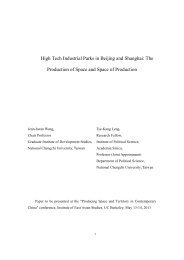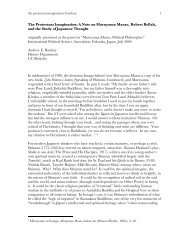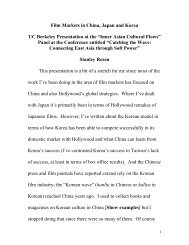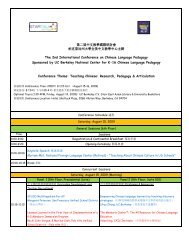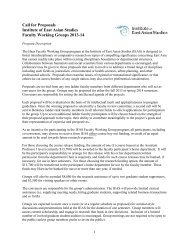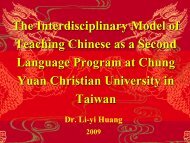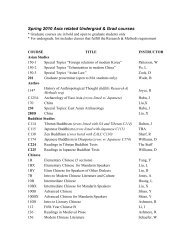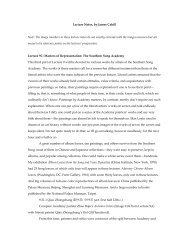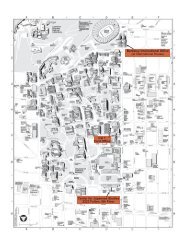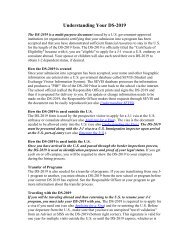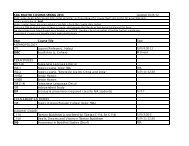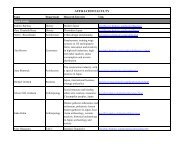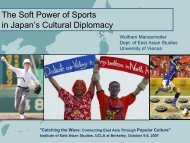Third Edition Spring 2013 - Institute of East Asian Studies, UC ...
Third Edition Spring 2013 - Institute of East Asian Studies, UC ...
Third Edition Spring 2013 - Institute of East Asian Studies, UC ...
You also want an ePaper? Increase the reach of your titles
YUMPU automatically turns print PDFs into web optimized ePapers that Google loves.
The Success <strong>of</strong> Environmental NGOs in Suharto’sIndonesiaThe Success <strong>of</strong> EnvironmentalNGOs in Suharto’s IndonesiaRachel PhoaAbstractDespite the abundant research on non-governmental organizations(NGOs) during Suharto’s authoritarian regime in Indonesia, little research has focusedspecifically on environmental NGOs (ENGOs) during this period. However,given the relative success <strong>of</strong> ENGOs compared to many other NGOs under the Suhartoregime, understanding why ENGOs succeeded can help us in understandingwhy or how NGOs succeed in authoritarian regimes. By means <strong>of</strong> an extensivesurvey <strong>of</strong> secondary literature on ENGOs in Indonesia as well as reports fromprominent international NGOs and inter-governmental organizations, I concludethat the fundamental cause for the ENGOs’ success was international pressureon the Suharto regime to address the environmental damage that its extractiveeconomic policies had caused. This pressure, combined with increasing governmentdebt in the 1980s as a result <strong>of</strong> falling oil prices, worked to constrain theSuharto regime’s suppression <strong>of</strong> ENGOs through two main mechanisms: 1) theregime was forced to rely on ENGOs’ resources to address the extensive environmentaldamage and thus could not afford to suppress them completely, and2) support from foreign governments and international NGOs for the work <strong>of</strong>Indonesian ENGOs made it harder for Suharto to suppress these ENGOs, even ifhe had wanted to. Thus, on the whole, this study adds to our understanding <strong>of</strong>how NGOs in authoritarian regimes may enjoy differing types <strong>of</strong> leverage againstthe government depending on the sector they operate in.Mention <strong>of</strong> Suharto’s Indonesia <strong>of</strong>ten conjures up images<strong>of</strong> a country ruled by an iron-fisted dictator. However, even afterSuharto’s regime implemented laws that restricted the activities<strong>of</strong> non-governmental organizations (NGOs) to nation-building andset limits on the amount <strong>of</strong> foreign funding that they could receive,environmental NGOs (ENGOs) continued to flourish in Indonesia.This paper investigates this unexpected phenomenon in the context<strong>of</strong> the strong international concern that existed at the timeover the environmental destruction occurring in Indonesia.After wresting power from Sukarno in 1966 and becomingthe president <strong>of</strong> Indonesia, Suharto implemented economic policiesthat led to Indonesia rapidly becoming an economic “<strong>Asian</strong>success story.” 1 These policies secured his legitimacy, but only atthe expense <strong>of</strong> the environment. 2 Throughout Suharto’s reign, Indonesia’sforest-based industries like plywood, paper production,and logging ranked second only to its petroleum industry in terms<strong>of</strong> contribution to the Gross National Product (GNP). 3 This resultedin significant ecological damage to Indonesia’s forests and otherecosystems that caught global attention. 4 In addition, although Suharto’sgovernment did introduce some environmental regulationswhen domestic and international concern over environmentaldegradation increased, it <strong>of</strong>ten failed to enforce these regulationsbecause the main beneficiaries <strong>of</strong> the extractive policies were eliteownedcompanies connected to the government. 51 Hall Hill, “The economy,” in Indonesia’s New Order, ed. Hal Hill (Honolulu:University <strong>of</strong> Hawaii Press, 1994), 54.2 Ronnie Lipschutz, Global Civil Society and Global Environmental Governance(New York: State University <strong>of</strong> New York, 1996), 169. From the chapter “EnvironmentalOrganizing in Indonesia.”3 Christopher Barr, Banking on sustainability: Structural Adjustment and ForestryReform in Post-Suharto Indonesia (Bogor, Indonesia: Center for International ForestryResearch, 2001), 19.4 Craig Thorburn, “Regime Change -- Prospects for Community-Based ResourceManagement in Post-New Order Indonesia,” Society and Natural Resources 15 (2002):617.5 Robert Cribb, “More Smoke than Fire: the 1997 ‘Haze’ crisis and other envi-41 Rachel Phoa Environmental NGOs in Indonesia 42



